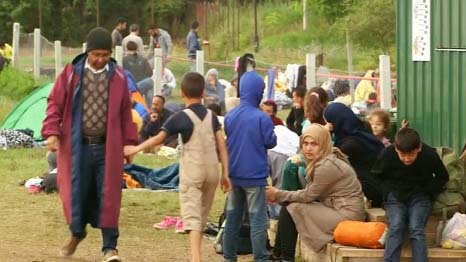
AFP, Brussels :Faced with its worst migrant crisis since World War II, Europe has many sensible options to deal with people fleeing conflict in Syria and elsewhere — but can’t agree on any of them.The situation has accelerated over the summer with a new stream of migrants arriving via the Balkans, adding to those braving death to cross the Mediterranean or risking their lives to enter the Channel Tunnel.Efforts to redistribute refugees around the European Union have been hobbled by a lack of unity among governments running scared of right-wing populist parties.Meanwhile, measures to stop the flow of asylum seekers at its source in the Middle East and North Africa have stalled because the turbulence in the region means Brussels has no stable governments it can deal with.With no solution in sight, European countries are now resorting to desperate measures to keep out equally desperate migrants, such as a huge razor fence that Hungary is erecting on its Serbian border. Officials and experts say EU states need to act quickly before the situation becomes uncontrollable, with no end in sight to the wars and political repression that are making the migrants flee.”At the end of the day we need to do something, and it’s much better to do something when you’re still in control rather than when you’re no longer in control,” an EU diplomat told AFP.”We need to work on several strands at the same time: how to divide the burden among Europeans, how to control better the external border, how to increase the cooperation with the countries of transit.”European leaders were spurred to action in April after more than 700 migrants drowned in the Mediterranean, in the worst tragedy of its kind. But they later squabbled over a quota plan for the redistribution of migrants to ease the pressure on Greece and Italy.A chaotic summer break — which saw migrants being teargassed in Macedonia and Hungary experiencing its highest ever daily number of arrivals with 2,100 people — has once again raised the sense of urgency.German Chancellor Angela Merkel and French President Francois Hollande held emergency talks on Monday, calling for a “unified system”.Berlin has led the way in recent days, saying that it expects to take in 800,000 asylum seekers in 2015 — more than the rest of the EU combined. It has also halted the deportation of Syrian asylum-seekers to their first point of entry into the EU, as countries are supposed to do under EU rules.The European Commission hailed the German move as “European solidarity” and said it hoped the comments by Merkel and Hollande “will be echoed in other capitals.”Meanwhile, Serbia will never close its borders to migrants, Prime Minister Aleksandar Vucic told Reuters on Wednesday, but he said EU leaders must help frame a plan on how to cope with the tens of thousands pouring into the Balkan region.About 100,000 migrants, many of them from Syria and other conflict zones in the Middle East, have entered Serbia this year on their way north to Hungary and Europe’s Schengen zone of passport-free travel. Hungary is building a 3.5-metre high fence along its 175-km (110-mile) border with Serbia seeking to keep the migrants out.”We will never erect any fences, any walls,” Serbian Prime Minister Aleksandar Vucic said in an interview ahead of the Western Balkans Summit in Vienna.

